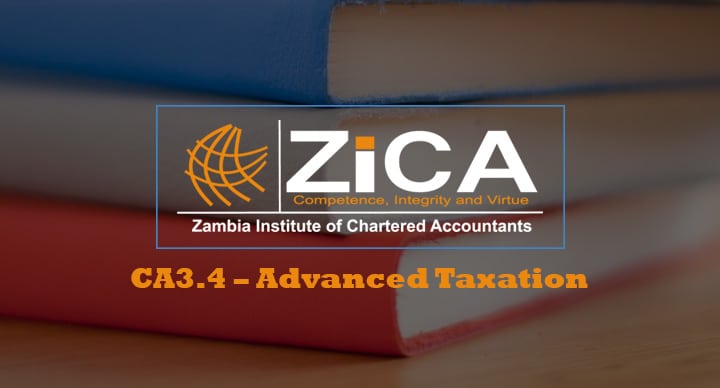CA3.4 – Advanced Taxation
No access plans exist.

Course Features
Course Details
CA3.4-Advanced Taxation
On completion of this module, candidates will reach a competency sufficient to be able to:- Explain tax and investment regulation in Zambia
- Explain tax audits
- Calculate tax liabilities for individuals and businesses on local and international transactions
- Advise on tax planning opportunities
- Identify and respond appropriately to ethical issues arising in the course of performing tax work
| Syllabus topics | Weighting (%) | LO |
| The framework for taxation in Zambia | 15 | 1, 2 and 3 |
| Tax audits | 10 | 4 |
| Tax liabilities for mining, financial services and financial arrangements | 30 | 5, 6 and 7 |
| International aspects of taxation | 15 | 8 |
| Tax planning | 15 | 9 |
| Ethical issues in tax practice | 15 | 10 |
Learning outcomes
- LO1: Explain the nature of taxation and investment regulation in Zambia
- LO2: Explain the interaction of taxes, prepare relevant tax computations and advise when the taxes are payable
- LO3: Evaluate the tax implications of the various investment opportunities and calculate the taxes payable
- LO4: Explain the approaches to carrying out tax audit and investigations, and explain appropriate tax investigation methods
- LO5: Calculate taxes payable on mining income and gains computed using applicable tax law
- LO6: Calculate taxes payable by enterprises in the financial services sector
- LO7: Advise on the taxation implications of various financial arrangements that could be made by individuals and enterprises
- LO8: Advise Zambian individuals and businesses, including multinational enterprises, on international dimension relevant to their taxation circumstances
- LO9: Advise on appropriate tax planning issues for individuals and business
- LO10: Explain and apply appropriate ethical standards to taxation practice
- The framework for taxation in Zambia: LO1, 2, 3
- Explain the nature of taxation and investment regulation in Zambia, dealing specifically with legal, administrative and political environment of the Zambian tax system
- Explain the interaction of taxes, prepare relevant tax computations and advise when the taxes are payable, dealing specifically with:
- Liability of various persons to taxes and collection of taxes using a wide range of methods such as self-assessment, direct assessment, deduction at source and so on
- Objections and appeals procedure in respect of all extant taxes
- Income Tax liabilities for sole traders, partners, employees and individuals with investment income and farming income
- Interaction of corporate taxation and withholding taxes
- Value Added Tax, Customs and Excise, Capital Allowances and Income Tax
- Property Transfer Tax, estates and trusts
- Presumptive Taxes, Capital Allowances and losses
- Evaluate the tax implications of the various investment opportunities and calculate the taxes payable, dealing specifically with:
- Types of business investment in Zambia
- Taxation of inward investments
- Taxation of outward investments
- Taxation incentives under the Zambia Development Agency Act
- Negotiating fiscal incentives with government
- Tax audits and investigations: LO4
- Explain the approaches to carrying out tax audit and investigations, and explain appropriate tax investigation methods, dealing specifically with:
- Introduction to tax audits
- Basis of accounting, ratio analysis and preliminary review of financial statements
- The statement of financial position/balance sheet
- Incomplete records of taxpayers
- Uncovering hidden income
- Perpetual tax loss position and loss harvesting
- Explain the approaches to carrying out tax audit and investigations, and explain appropriate tax investigation methods, dealing specifically with:
- Tax liabilities for mining, financial services, and financial arrangements: LO5, 6, 7
- Calculate taxes payable on mining income and gains computed using applicable tax law, dealing specifically with:
- Introduction to mining operations
- Treatment of revenue and capital expenditure, including environmental expenditure
- Mining Tax losses and their indexation
- Tax incentives for mining operations
- Capital allowances and their indexation
- Thin capitalization and tax treatment of hedging income
- Income Tax computations for mining operations
- Mineral Royalty Tax
- Variable Profit Tax
- Calculate taxes payable by enterprises in the financial services sector, dealing specifically with
- Nature of the financial services sector
- Meaning of bank and insurance company for taxation purposes
- Computing taxable income and Income Tax payable by banks
- Computing Income Tax payable by insurance companies on both general insurance and life insurance business
- Computing taxable income and Income Tax payable on management of pension
- Advise on the taxation implications of financial arrangements for individuals and enterprises, dealing specifically with:
- General tax policy and financial principles relevant to the Income Tax treatment of financial instruments
- Zambian tax law applicable to financial instruments including debt/equity rules, hire purchase, leasing and sale and lease back
- Debt-financing techniques, particularly the treatment of interest surrogates and hybrid debt instruments
- Personal financial planning
- Collective investment plans
- Deposit based investments
- Pension scheme planning and the role of the National Pension Scheme Authority
- Calculate taxes payable on mining income and gains computed using applicable tax law, dealing specifically with:
- International aspects of taxation: LO8
- Advise Zambian individuals and businesses, including multinational enterprises, on international dimension relevant to their taxation circumstances, dealing specifically with:
- Liability of residents and non-residents to Income Tax
- Liability of foreign income to Income Tax and basis of assessment
- Trading within Common Market for Eastern and Southern Africa
- (COMESA) and Southern Africa Development Community (SADC)
- Indirect taxes on overseas operations
- Double taxation conventions and the Organisation for Economic Co-operation and Development (OECD) model
- Methods of giving double taxation relief
- Transfer pricing and thin capitalisation
- Taxation of multinational enterprises
- International tax avoidance
- Advise Zambian individuals and businesses, including multinational enterprises, on international dimension relevant to their taxation circumstances, dealing specifically with:
- Tax planning: LO9
- Advise on the measures that could be put in place to minimise or defer taxation liabilities, dealing specifically with:
- The differences between tax planning, tax avoidance and tax evasion
- Employment compared with self-employment from a tax point of view
- Tax implications of alternative remuneration packages
- Choice of business medium
- Tax implications of incorporation of a business
- Tax treatment of alternative ways of extracting profits from a company
- Tax implications arising from the disposal of a business
- Income Tax assessment of consolidated groups
- Treatment of entry and exits from a group
- Treatment of group losses
- Property Transfer Tax for groups of companies
- Value Added Tax in groups of companies
- Corporate insolvency and reconstruction
- Advise on the measures that could be put in place to minimise or defer taxation liabilities, dealing specifically with:
- Ethical issues in tax practice: LO10
- For a given business scenario explain how the fundamental principles of integrity, objectivity, professional competence and due care, professional behaviour and confidentiality apply when providing taxation services and identify and evaluate an appropriate course of action
- For a given business scenario explain the nature of and difference between tax avoidance and tax evasion and evaluate an appropriate course of action
- Design and recommend appropriate ethical safeguards in tax practice
This course does not have any sections.





